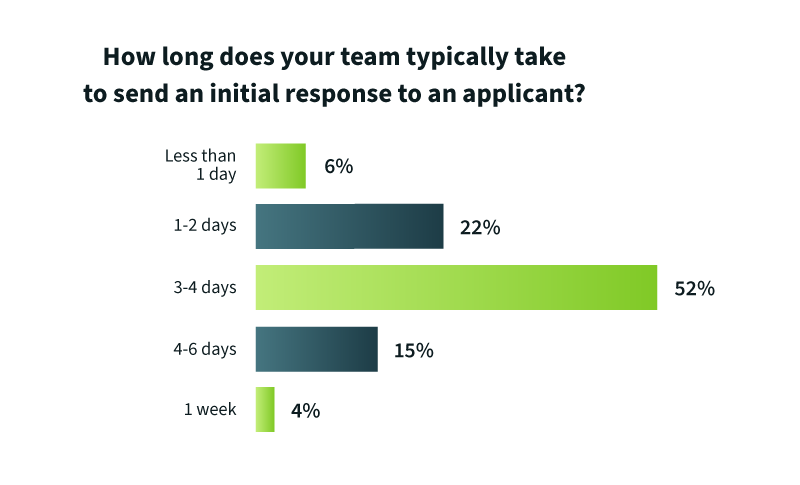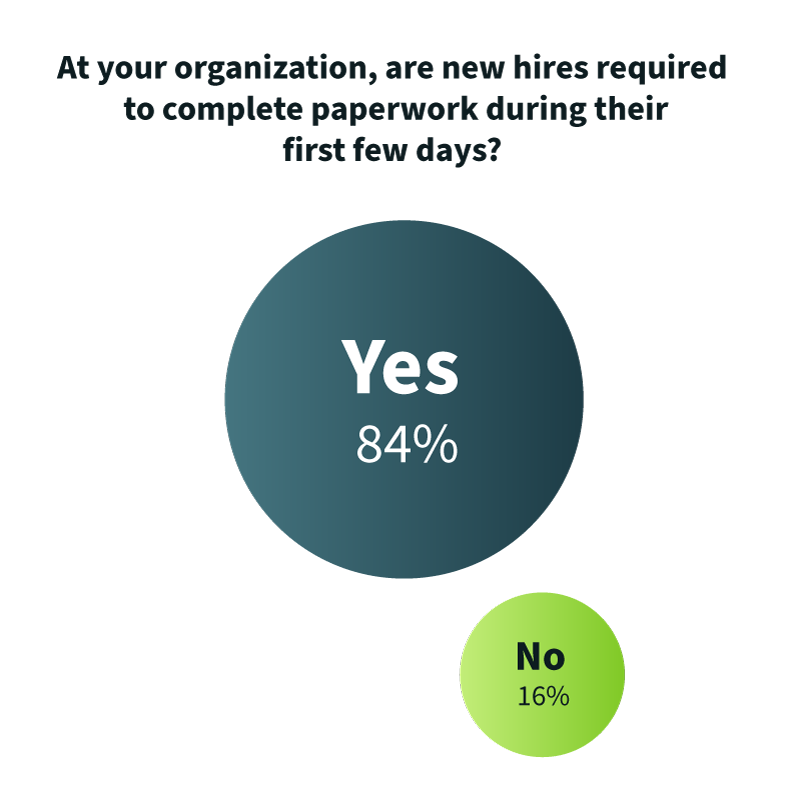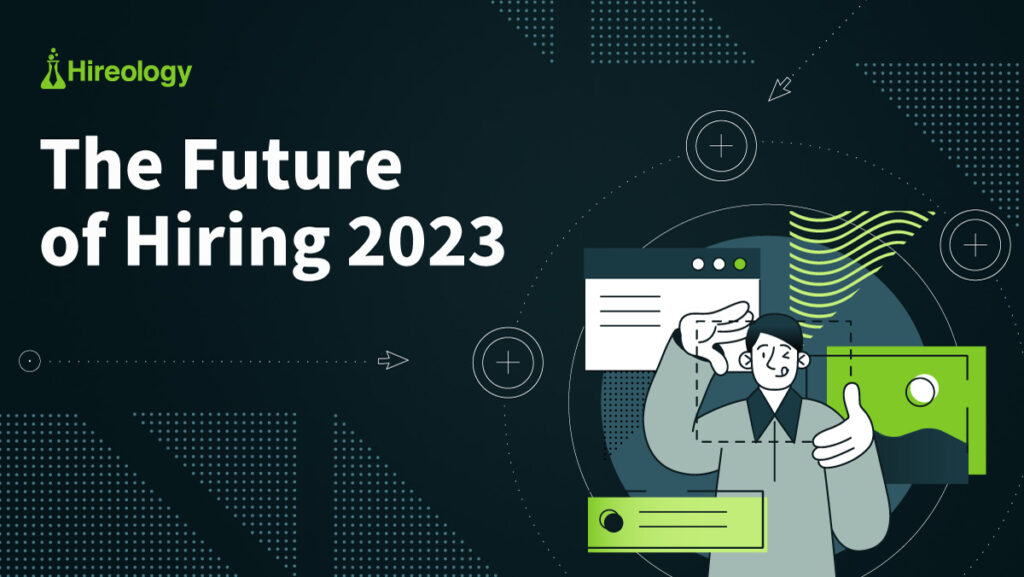5 opportunities for hospitality professionals to recruit and hire better in 2023 and beyond
Introduction
In November of 2022, Hireology surveyed 161 recruiters, hiring managers, and HR leaders specifically in the hospitality industry. We asked questions about the entire hiring process, from the best sources of applicants and eventual hires to the top challenges facing the industry, along with what their goals are for the year ahead.
One key finding from these results? To remain competitive, 78% of participants said they raised compensation ranges over the past year — but even that has not been enough to reach pre-pandemic employment levels. As of the April 2023 Bureau of Labor Statistics jobs report, the leisure and hospitality sector is 2.4% below February employment levels, a total of 402,000 missing workers. For those looking to hire in this industry, this tells us that while pay is still a deciding factor for candidates to accept a new role, there are other ways to gain a competitive recruiting edge.
The results of this survey have highlighted 5 people-focused opportunities for hiring professionals in the hospitality industry to capitalize on in 2023 and beyond. Read on to learn how to achieve your hiring and HR goals in the year ahead by being one of the first in the hospitality space to make the right changes to your recruitment and hiring practices.
Design jobs that workers actually want
Key finding: Only 24% of hoteliers offer career growth opportunities, the second most sought after benefit
The modern worker won’t accept an offer for a role that doesn’t financially take care of them, hence the trend of raising compensation ranges to remain competitive. With that in mind, there are other benefits that your hotel can offer that are extremely attractive to job seekers. For instance, hospitality applicants choose the roles they express interest in with three other perks in mind that most employers have not incorporated into their policies: career growth opportunities, schedule flexibility, and insurance benefits.
In order to create a role that job seekers actually want, then, your hotel needs to appeal to what hospitality job seekers are searching for — and you can do that by looking at what other hotels offer. Most hoteliers that responded to our survey (40%) have adapted some degree of schedule flexibility since the pandemic in order to fill vacant positions. This pivot to a nontraditional scheduling method has helped hoteliers compete in a labor market that is veering more towards a gig economy, but recent findings from our applicant study have indicated that job seekers are looking for long term employment — and that includes career growth opportunities. Fortunately for you, less than a quarter (24%) offer this increasingly important benefit. Workers also want (and need) access to health insurance, which 27% of respondents offer to their part time employees.

Earn referrals from your employees
Key finding: 21- 40% of hires come from employee referrals for 51% of survey takers
It’s no surprise that people like to work with friends at jobs they enjoy. This makes sense considering that 17% of our participants responded that employee referrals were the highest driver of quality hires for their hotel; overall, this was second only to school partnerships.
Employee referral programs have come a long way — have you updated how you communicate the existing benefits to your team recently? If not, you could be losing out on one of the best drivers for new hires simply because your staff doesn’t know about it. According to our results, 33% of hotels don’t communicate their existing employee referral programs at all!
If you do have a communication strategy in place, does it reflect modern communication channels or is still stuck in the 2000’s? For instance, 27% of respondents indicated that they still use emails to advertise their employee referral program, while only 19% send text messages. Instead of making employees wade through overcrowded inboxes for an email they may or may not see, why not send them a text directly to their phone to up the odds that they’ll read it? This strategy is a win/win for everyone involved, especially if you provide bonuses or other incentives to encourage participation.

Partner with local schools for a top notch source of talent
Key finding: School partnerships provide the best quality of hire for 26% of respondents
Simply put: there’s no better place to find top talent in your community than by partnering with your local schools. By doing so, you could pull from two potential types of applicants: students who are looking to earn some extra money to pay for expenses and graduates who are beginning their search for a career. This strategy has paid off in significant ways for the majority of our survey takers (23%), who responded that school partnerships drive the most applicants for them. These results were followed by digital methods, like SEO (13%) and customized career sites (14%).
These results should come as no surprise to seasoned hospitality professionals, however. Our data revealed that 42% of participants use school partnerships in their recruitment efforts. If your hotel hasn’t adopted this strategy to your recruitment methods yet, 2023 is the time to begin exploring school partnerships and what they can do for you.
areer. This strategy has paid off in significant ways for the majority of our survey takers (23%), who responded that school partnerships drive the most applicants for them. These results were followed by digital methods, like SEO (13%) and customized career sites (14%).
These results should come as no surprise to seasoned hospitality professionals, however. Our data revealed that 42% of participants use school partnerships in their recruitment efforts. If your hotel hasn’t adopted this strategy to your recruitment methods yet, 2023 is the time to begin exploring school partnerships and what they can do for you.

Speed up responses to secure the best candidates
Key finding: For 52% of survey takers, the average initial response time
to an application takes 3 - 4 days
Higher pay is no longer enough of an incentive to make the hires your hotel needs to provide a great guest experience. With 78% of our respondents raising compensation ranges in the last year to remain competitive in this hiring market, you need another way to sway top talent to join your team. The best way to do this is by moving with urgency in your hiring process to make the process as quick as possible. For 42% of survey takers, the entire hiring process takes 15 – 21 days from initially receiving the application to offer acceptance; that’s time that your competitor could sweep in and steal your candidate.
By moving quickly in your hiring process, you also reduce the risk of wasting time on ghosted interviews and offers. Just when you think you’ve got great talent on the line, they no call, no show to an interview or completely skip out on their first day. Our data showed that 86% of hoteliers had an interview ghosted in the last year, while 79% had candidates completely bail on an extended offer. Moving with urgency allows you to keep candidates warm and engaged in your hiring process, so that you’re still top of mind. The goal is to get your hiring process down to 14 days maximum — and the best place to begin is by responding as quickly as possible to newly submitted applications.

HR technology does more than just recruit
Key finding: For 84% of respondents, new hires spend their first few days
on the job filling out paperwork
If you’re using the right hiring platform, HR technology doesn’t cease to be useful once you’ve made a hire. For 53% of our survey takers, however, it might seem like more of a hassle than help since they indicated that their biggest issue going into 2023 is inefficient and/or outdated HR technology. With the right software in place, you can not only attract and hire top talent, but manage the entire employee lifecycle — all in one place! This is extremely important for retention efforts, as 32% of respondents indicated having a turnover rate of 16 – 20%; that’s around a fifth of their staff being replaced at some point during the year.
The first place to start implementing changes with a new HR software is with onboarding. You want to start new employees out on the right foot for them and for your hotel. Instead of having them spend time filling out paperwork, begin digital onboarding new hires before their first day on the job. That way, you have all of the necessary information for HR and they can start the important training process right away. Plus, you’re also eliminating the risk of sensitive data being inaccurately entered, which ultimately can impact paychecks along with other timely and morale-boosting (or crushing!) aspects.

Conclusion
Resorts, hotels, and other getaways will always need staff in order to provide the best guest experience possible, but there are great strides that need to be made in order to reach pre-pandemic employment levels. Hoteliers like you continue to face difficulties attracting the right people to fill your open roles in an ever shrinking talent pool and to retain them, which ultimately impacts the quality of your guest experience.
Making the right hires in 2023 requires that you stand out from the crowd of potential employers in both your job offerings and hiring processes. To do this, you need to seriously consider where the five opportunities we explored in this report can be implemented at your organization. Keep in mind: leading hotel brands won’t simply stop with the suggestions we’ve covered here, so be prepared for bigger and better thinking surrounding recruiting and hiring as we had into the post-pandemic era with a new definition of work.

